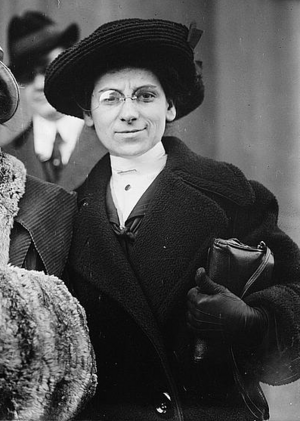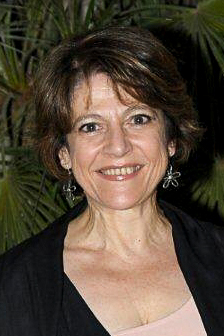List of abolitionists facts for kids
This article is about people and groups who worked to end slavery. These people are often called abolitionists. They believed that slavery was wrong and fought to make it illegal everywhere. Their efforts helped change laws and minds around the world.
Contents
Groups Fighting Slavery
Many groups, both in the past and today, have worked to end slavery. They organized, protested, and helped people escape.
Historical Groups
In the past, many groups formed to fight slavery, especially in the 18th and 19th centuries when slavery was common in many parts of the world.
- African Methodist Episcopal Church (American): A church that supported freedom for African Americans.
- American Anti-Slavery Society (American): A large group in the United States that pushed for slavery to end.
- Anti-Slavery Society (British): A key British group working to abolish slavery.
- British and Foreign Anti-Slavery Society (British): Founded in 1839, this group still exists today as Anti-Slavery International.
- Committee for the Abolition of the Slave Trade (British): This group worked to stop the buying and selling of enslaved people.
- Free Soil Party (American): A political party that opposed the spread of slavery into new U.S. territories.
- Religious Society of Friends (Quakers): A religious group that was one of the first to speak out against slavery.
- Society for Effecting the Abolition of the Slave Trade (British): An important British group that helped end the slave trade.
- Society of the Friends of the Blacks (Société des Amis des Noirs) (French): A French group that worked to end slavery.
Modern Anti-Slavery Groups
Even today, slavery exists in different forms, like human trafficking. Many organizations are working to stop it.
- A21 Campaign: A group fighting human trafficking around the world.
- Anti-Slavery International: This organization works globally to end all forms of modern slavery. It is one of the oldest human rights organizations in the world.
- Coalition Against Trafficking in Women: An international group that opposes human trafficking.
- Free the Slaves: An organization dedicated to ending slavery worldwide.
- International Justice Mission: This group works to rescue victims and bring criminals to justice.
- Polaris Project: A non-profit group that works to fight and prevent modern slavery and human trafficking in the U.S.
- Stop the Traffik: A global campaign that aims to end human trafficking.
- Truckers Against Trafficking: This group trains truck drivers to spot and report human trafficking.
Individuals Who Fought Slavery
Many brave individuals, from different backgrounds and countries, dedicated their lives to ending slavery.
Historical Figures
These people lived during times when slavery was legal and fought hard to change things.
- Abigail Adams (American): The wife of President John Adams, she spoke out against slavery.
- John Quincy Adams (American): A U.S. President who had a long history of opposing slavery.
- Richard Allen (American): A former slave and a founder of the African Methodist Episcopal Church.
- Susan B. Anthony (American): A famous activist who fought for women's rights and against slavery.
- Henry Ward Beecher (American): A well-known preacher who spoke strongly against slavery.
- Simón Bolívar (Venezuelan): A military and political leader who helped free several South American countries from Spanish rule and also worked to end slavery in those regions.
- John Brown (American):
An abolitionist who believed in using armed action to overthrow slavery. He was executed for leading a raid in 1859.
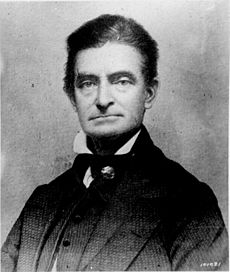 John Brown (1800-1859), an abolitionist who believed in using force to end slavery.
John Brown (1800-1859), an abolitionist who believed in using force to end slavery. - William Wells Brown (American): A former slave who became a writer and speaker against slavery.
- Thomas Fowell Buxton (British): A key leader in the British movement to abolish slavery.
- Elizabeth Buffum Chace (American): An activist who worked for women's rights and against slavery.
- Lydia Maria Child (American): An American writer and activist who supported abolition.
- Thomas Clarkson (British): A leading figure in the British movement to end the slave trade.
- Levi Coffin (American): Known as the "President of the Underground Railroad," he helped many enslaved people escape to freedom.
- Frederick Douglass (American): A former slave who became a powerful writer, speaker, and leader in the abolitionist movement. He fought for freedom and equality.
- Ralph Waldo Emerson (American): A famous writer and philosopher who supported the abolitionist cause.
- Olaudah Equiano (British): A former slave from Nigeria who wrote an influential book about his experiences, helping to turn public opinion against slavery.
- Benjamin Franklin (American): One of the Founding Fathers of the United States, he became a strong opponent of slavery later in his life.
- William Lloyd Garrison (American): A prominent abolitionist who published The Liberator, an anti-slavery newspaper.
- Ulysses S. Grant (American): A U.S. General and later President who led the Union to victory in the Civil War, which ended slavery.
- Angelina Grimké (American): A Southern woman who, along with her sister Sarah, became a powerful speaker against slavery.
- Sarah Moore Grimké (American): Like her sister Angelina, she was a strong voice against slavery and for women's rights.
- Alexander Hamilton (American): One of the Founding Fathers, he was involved in early efforts to end slavery in New York.
- Harriet Jacobs (American):
A former slave who wrote the influential book Incidents in the Life of a Slave Girl, sharing her experiences.
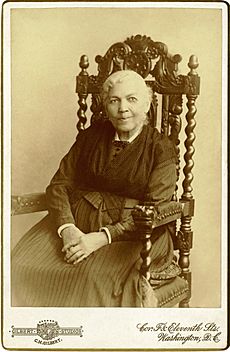 Harriet Jacobs was a former slave who wrote a famous book about her life, Incidents in the Life of a Slave Girl.
Harriet Jacobs was a former slave who wrote a famous book about her life, Incidents in the Life of a Slave Girl. - John Jay (American): One of the Founding Fathers and the first Chief Justice of the U.S. Supreme Court, he worked to end slavery in New York.
- Fanny Kemble (British): An actress who wrote about the harsh realities of slavery on a Georgian plantation.
- Abraham Lincoln (American): The U.S. President during the Civil War who issued the Emancipation Proclamation, leading to the end of slavery in the United States.
- David Livingstone (Scottish): A missionary and explorer who spoke out against the slave trade in Africa.
- Rose Livingston (American): A former slave known as the "Angel of Chinatown" for her work freeing enslaved people in New York City.
- Toussaint Louverture (Haitian): A former slave who became a brilliant military leader of the Haitian Revolution, leading to Haiti's independence and the end of slavery there.
- Benjamin Lundy (American): An early abolitionist who published anti-slavery newspapers.
- Lucretia Mott (American): A Quaker minister and activist who fought for women's rights and against slavery.
- John Newton (British): A former slave ship captain who later became a minister and wrote the hymn "Amazing Grace." He became a strong abolitionist.
- Thomas Paine (British-born American): A writer and revolutionary who spoke out against slavery.
- Theodore Parker (American): A Unitarian minister and abolitionist whose words inspired leaders like Abraham Lincoln and Martin Luther King Jr.
- Wendell Phillips (American): A powerful speaker and leader in the abolitionist movement.
- Robert Purvis (American): A wealthy African American abolitionist and advocate for racial equality.
- Ignatius Sancho (British): A former slave, writer, and composer who became the first African to vote in a British election.
- William H. Seward (American): A politician who served as Secretary of State under President Lincoln and was a strong opponent of slavery.
- Granville Sharp (British): A key figure in the British movement to abolish the slave trade.
- Kathleen Simon, Viscountess Simon (British):
She was honored for her work to fight against remaining forms of slavery in the British Empire.
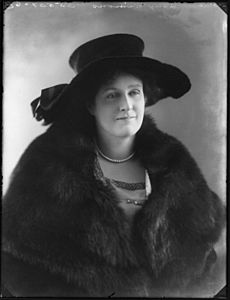 Kathleen Simon, Viscountess Simon was recognized for her efforts to combat remaining forms of slavery in the British Empire.
Kathleen Simon, Viscountess Simon was recognized for her efforts to combat remaining forms of slavery in the British Empire. - Gerrit Smith (American): A wealthy reformer who supported many causes, including abolition.
- Elizabeth Cady Stanton (American): A leading figure in the women's rights movement and an abolitionist.
- Harriet Beecher Stowe (American): The author of Uncle Tom's Cabin, a novel that greatly influenced public opinion against slavery.
- Charles Sumner (American): A U.S. Senator who was a leading voice against slavery.
- Arthur Tappan (American): A wealthy merchant and abolitionist who helped fund many anti-slavery efforts.
- Lewis Tappan (American): Arthur's brother, also a wealthy merchant and a key figure in the abolitionist movement.
- Henry David Thoreau (American): A writer and philosopher who advocated for civil disobedience against unjust laws, including those supporting slavery.
- Sojourner Truth (American): A former slave who became a powerful speaker for abolition and women's rights.
- Harriet Tubman (American): A former slave and conductor on the Underground Railroad, she bravely led many enslaved people to freedom.
- William Wilberforce (British):
A leading English politician who successfully led the parliamentary campaign to abolish the slave trade and later slavery in the British Empire.
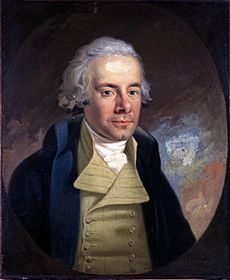 William Wilberforce (1759-1833), a leading English abolitionist, led the fight in Parliament to end the slave trade and later slavery itself.
William Wilberforce (1759-1833), a leading English abolitionist, led the fight in Parliament to end the slave trade and later slavery itself. - John Woolman (American): A Quaker minister who traveled widely to persuade people to oppose slavery.
Modern Figures
These individuals are still working today to end modern forms of slavery and human trafficking.
- David Batstone (American): Founder of the non-profit organization Not for Sale, which fights modern slavery.
- Don Brewster (American): Founder of Agape International Missions, working against trafficking in Cambodia.
- Durga Ghimire (Nepali): Founder of ABC Nepal, working against trafficking of girls and minors.
- Maria Grazia Giammarinaro (Italian): A leading Italian abolitionist and the UN Special Rapporteur on trafficking in persons, raising awareness about the issue.
- Siddharth Kara (American): An author and researcher who writes about modern slavery and bonded labor.
- Somaly Mam (Cambodian): Founder of the Somaly Mam Foundation, which helps victims of trafficking.
- Bukola Oriola (Nigerian): A former slave and author who shares her story to fight trafficking.
- Elizabeth Smart (American): A former slave who founded the Elizabeth Smart Foundation to help prevent child abduction and exploitation.
- Helen Sworn (English): Founder of Chab Dai, a group connecting Christian organizations fighting abuse and trafficking.
 | Mary Eliza Mahoney |
 | Susie King Taylor |
 | Ida Gray |
 | Eliza Ann Grier |


